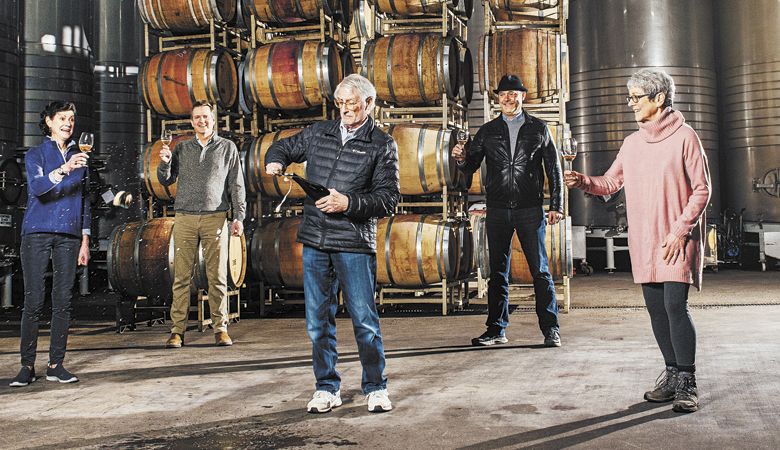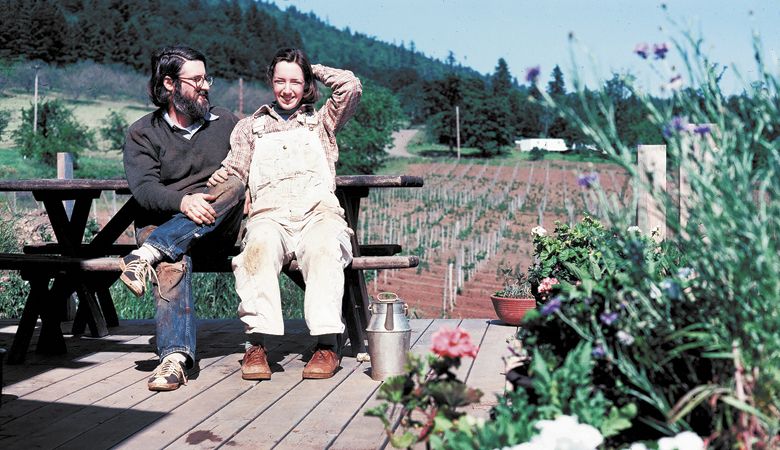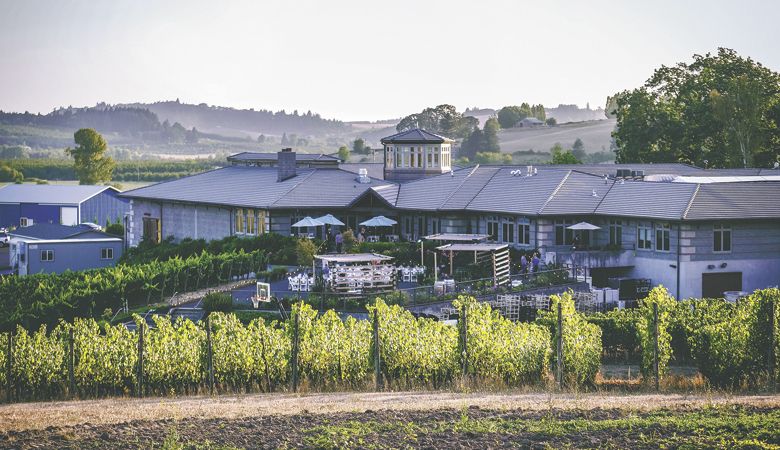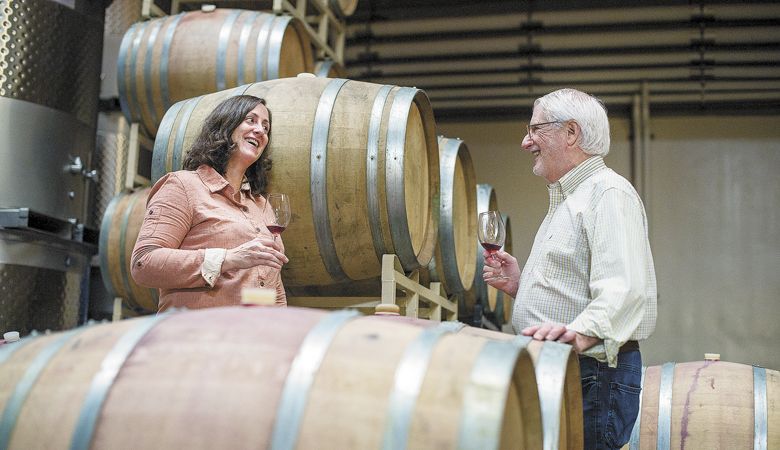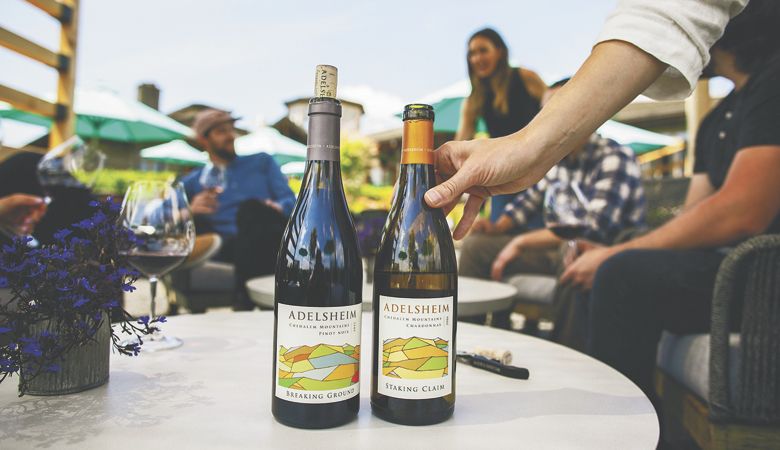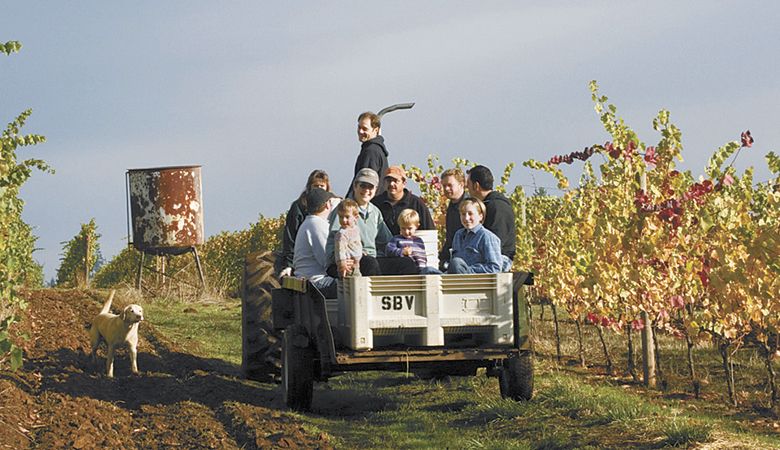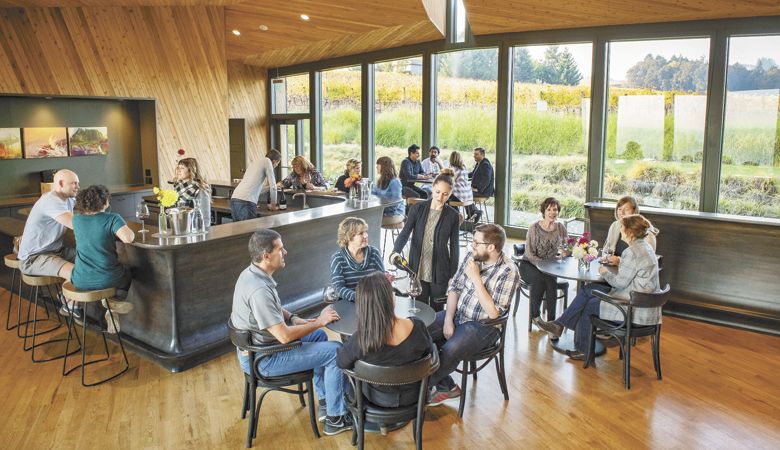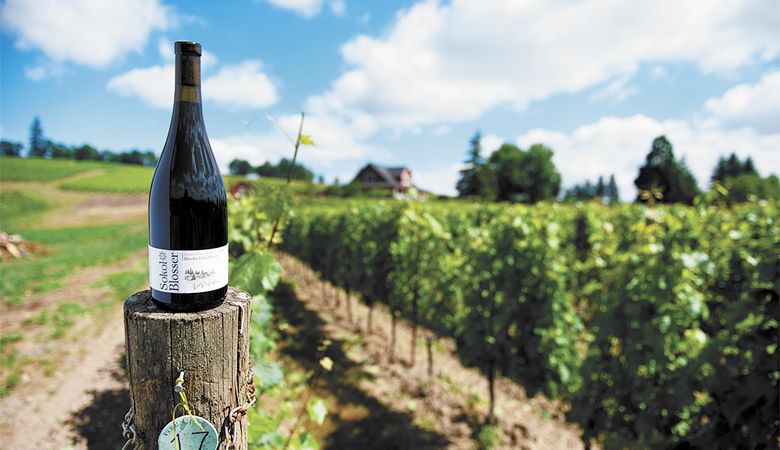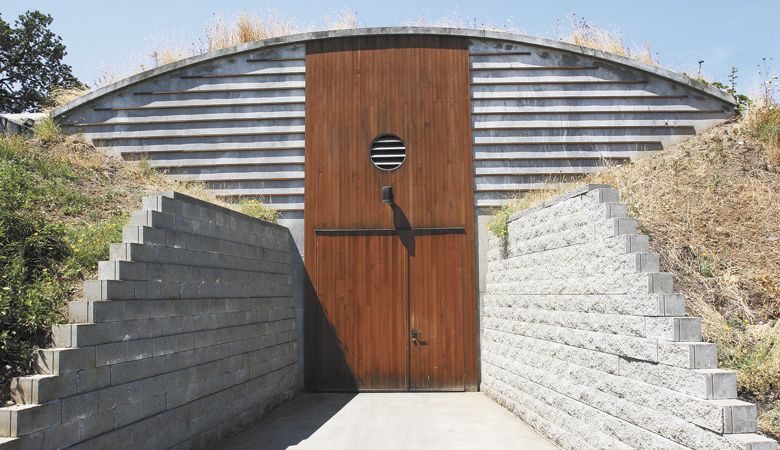Fifty/Fifty
Adelsheim and Sokol Blosser combine for a century of Oregon wine
By Sophia McDonald
In 2021, two of the Willamette Valley’s original wineries — Adelsheim Vineyard in Newberg and Sokol Blosser Winery in Dayton — are commemorating their golden anniversaries. Their influential leaders share some reflections on their past, talk about what they’re doing in the present and provide a glimpse into the future and, if the Oregon industry is so fortunate, the next 50.
Adelsheim Vineyard
David Adelsheim was in the Army during the Vietnam War; however, he was stationed 2000 miles away in Korea. There received his first serious introduction to the genteel subject of wine. “I had a captain who was from Puerto Rico who really knew wine,” he said. “We didn’t taste wine a lot, but from time to time, he would find a bottle, and he would talk about it in a much more serious way than I was used to hearing about wine.”
In 1969, David and his then-wife, Ginny Adelsheim, spent a summer camping out of the back of a car in Europe. The Old World did much to advance his knowledge of food, wine and their symbiotic relationship. When the couple returned to Portland, “Ginny finished up at college, and I took an uninteresting job at a bank and read every book I could find about wine,” he said.
His interest in wine remained just that until 1971, when he and Ginny were drawn in by the “back to the land” movement sweeping through America. The Adelsheims were among the wave of young people who purchased rural property in the hopes of becoming self-sufficient. “We started looking for land, and we heard that people were planting grapes. That was extremely exciting,” he said.
A chance encounter with Dick Erath and Bill Blosser earned the couple an invitation to a May Day picnic with David and Diana Lett of The Eyrie Vineyards. “By June 4, 1971, we were buying a piece of land with the intent of probably planting some grapes,” he said. They put their first vines in the ground the following year, but even then, the couple didn’t envision devoting themselves full-time to the wine industry.
Their dedication began to change as they became more involved in both their work and Oregon’s fledgling wine industry. David is quick to point out that all the “founding families” in the Willamette Valley’s wine scene played some role in creating the industry that is known worldwide today.
David wrote Oregon’s strict wine labeling regulations and lobbied for their passage with the Oregon Liquor Control Commission. He authored petitions for the Willamette Valley, Umpqua Valley and Chehalem Mountains AVAs. He was a leading voice in restructuring the Oregon Wine Board and Oregon Winegrowers Association, and played a role in organizing major events such as the International Pinot Noir Celebration and Oregon Pinot Camp.
David stayed at the helm of the company until 2017. That year, he and Ginny sold their stake to their long-time partners, Lynn and Jack Loacker, and the company hired a CEO. The change allowed David to take a step back from the day-to-day operations and focus on other projects.
Right now, he’s particularly excited to be working on the Chehalem Mountains AVA Neighborhood Project. “Since 2006, when the Chehalem Mountains AVA was approved, people growing grapes within the AVA have had a geographic area to point to when someone has asked, ‘Where are your grapes from?’” David said. “But we have not been able to answer the next question: ‘What do your Pinot Noirs taste like?’ That’s because our AVA has so much variability: elevations, exposures, presumably vineyard meso-climates and, most obviously, soils.
“We’ve known our wines have different tastes and styles and that a lot of those differences have to do with where our grapes are planted,” he continued. “But we haven’t been able to get our arms around those differences and come up with a grand unified explanation that would help everyone make sense of the differences we see in our wines. And we need to do that if those people are to appreciate the wines from our appellation.” The project will spend the next six years trying figure out the nuances of a real explanation.
David and the marketing team have also been hard at work on a project they’re calling Founders’ Stories, commemorating the winery’s 50th anniversary. For the 10-part video and podcast series, he personally conducted extensive interviews with owners from the other nine founding wineries in the Willamette Valley.
“It was an incredibly fun project in that I was forced into talking about the industry with each of these 10 individuals, or couples, over a historic period, not just about what we’re going to do next week,” he said. “You don’t usually get the opportunity to talk to people you’ve known for 50-plus years in that way.” The winery will release one episode per month for the rest of the year. This month’s entry showcases an interview with Diana Lett.
Over the course of the year, the company will release several commemorative wines. The first, available now, features three older vintages of the popular Elizabeth’s Reserve Pinot Noir selected by David and winemaker Gina Hennen.
Later this year, the company will begin selling the 1991 Steamboat Pinot Noir Conference poster print illustrated by Ginny. To further honor the artistic contributions she made to the winery — she illustrated the labels for many years — the winery is now releasing a yearly bottling of rosé featuring a label by a different artist. The artist for the newly released 2020 bottling is Portlander Jeremy Okai Davis.
David remains optimistic about what the future holds for the company. It has a passionate steward in Lynn Loacker — Jack passed away in 2020 — and a line of products admired throughout the world. Between the Founders’ Stories project and his own work to tell the company’s story, he and his colleagues are hard at work to ensure the company stays top of mind in the wine world and can remain a leader and innovator for the next 50 years.
Sokol Blosser Winery
Bill Blosser and Susan Sokol Blosser were also back-to-the-landers in the 1970s. Like many of Oregon’s other wine industry pioneers, “we were young urban professionals without much agricultural or even business experience,” said Susan. “So we were all driven by the thought of how wonderful it would be to live off the land.
“For us, the aesthetic of making something that added to the quality of life was compelling,” she added. That’s what led her and Bill to plant wine grapes on the 18 acres they acquired in December 1970 — the same month they had their first child. In the spring of ’71, the family got digging.
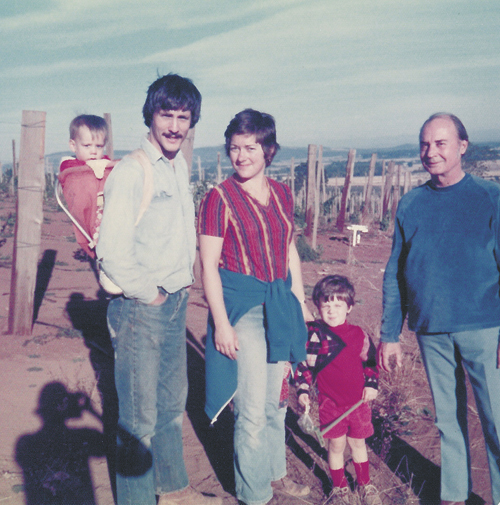
Susan still brims with youthful enthusiasm when she talks about the events of 50 years ago. “We knew that this was an area that was totally untested, that we wanted to grow a grape that had never done well in the U.S., and that we didn’t have a background in agriculture, but that just made it more of a challenge. We had a chance to develop something special — and by God, it worked. We were young enough — in our mid-20s — that we didn’t have a lot to lose. It was a risk that really sounded like fun.”
They quickly learned that “fun” was not the right word. “It was grueling,” she said. “It was constant work and facing challenges that we had no experience dealing with. It was exciting, but it was also painful.”
Despite all the obstacles, the couple didn’t waiver from their commitment to their business, or their grapegrowing colleagues. Bill put to good use his background as an urban planner by helping map out areas best suited for grape growing in the Willamette Valley, then advocating that they be protected from development. He chaired regulatory bodies such as the Oregon Land Conservation and Development Commission, and was active in starting groups such as the Oregon Winegrowers Association and Yamhill County Wineries Association.
Susan has been widely recognized for her efforts to improving Oregon’s natural and business environments. She was honored by the U.S. Soil and Water Conservation District for her work to prevent hillside erosion by using cover crops. She advocated to join the LIVE program for companies engaging in sustainable agricultural practices, helped the vineyards achieve organic certification and oversaw construction of the first LEED-certified winery building in the country.
Their whole lives revolved around the winery, and that meant their children’s did too. “Our idea of doing something as a family would be going to a wine festival,” Susan said. Three generations would pile into the car and travel to events like the Newport Food and Wine Festival. There, the couple was joined by Bill’s father, pouring wine for guests, while his mother would entertain the children.
“Neither Bill or I ever talked to our kids about coming into the business,” Susan said. “But they all grew up in the vineyard, and they said, ‘The vineyard is in our blood.” Middle son Alex Sokol Blosser started working with his mother in 1998. Alison Sokol Blosser, the youngest child, joined the family business in 2004. Oldest son Nik Blosser doesn’t work for the company but is still involved at the board level.
It didn’t take Susan long to figure out that her kids weren’t biding their time at the winery; they wanted to run it someday. In 2004, the company began a three-year leadership transition. At the end of that process, “The family board decided to make them co-presidents because they rose at the same level,” she said. “They both seemed so competent, but they were very different.” Alex also serves as winemaker, while CEO Alison handles more of the business side of the winery.
“Alex and I love what we do,” said Alison. “This is the only thing that we’re ever going to do with our lives. We have a very strong connection to the business and really view ourselves as stewards.”
Right now, she has her sights focused on growing the business and adapting it so it continues to meet the needs of modern consumers. “People are consuming wine differently — especially with the pandemic — and those purchasing patterns are here to stay,” Alison added. “While our heart is always going to be in producing amazing small-production Dundee Hills wines, we’re excited to also provide wines at a great price in a great package.”
Last year, the company began selling its Evolution wines in boxes for the first time. The winery also continues its curbside pick-up and delivery, and is investing more in e-commerce and communicating with people in new ways. “I’m excited to continue to push the envelope in terms of over-delivering to consumers what they want and how they want it,” said Alison.
Instead of throwing a 50th anniversary, the company has been looking at how it can help people enjoy wine at home. In February, the winery hosted its “1970s flash sale,” Alison explained. “We took one of our Pinot Noirs and sold it for 24 hours at the same price as our first bottling.” At $6.75 a bottle, they were sold out in less than a few hours. Club members and other customers will be invited to virtual tastings events where family members will share old stories and talk about the winery. For those who can make it to the tasting room, look for flights based on favorite family wines and a special Pinot Noir with a retro label that will pay homage to the brand’s origins.
Susan’s plans for the future include continuing her role as founder and staying involved in organizations such as the Yamhill Enrichment Society, a nonprofit she established to improve the lives of Yamhill County children through literacy and music.
Meanwhile, Alison is committed to keeping alive the gifts her parents gave the family and the state of Oregon so that future generations of her family have the same opportunities. “Fifty years from now, I hope whoever you’re interviewing from my family is saying something similar.”


